Toyota Prius: Climate Control Seat System
- Precaution
- Parts Location
- System Diagram
- How To Proceed With Troubleshooting
- Operation Check
- Customize Parameters
- Problem Symptoms Table
- Terminals Of Ecu
- Data List / Active Test
- Climate Control System does not Operate on Driver Side
Precaution
PRECAUTION
PRECAUTIONS FOR DISCONNECTING CABLE FROM NEGATIVE (-) AUXILIARY BATTERY TERMINAL
NOTICE:
After the ignition switch is turned off, there may be a waiting time before disconnecting the negative (-) auxiliary battery terminal.
Click here

HINT:
When disconnecting and reconnecting the auxiliary battery, there is an automatic learning function that completes learning when the respective system is used.
Click here


Parts Location
PARTS LOCATION
ILLUSTRATION
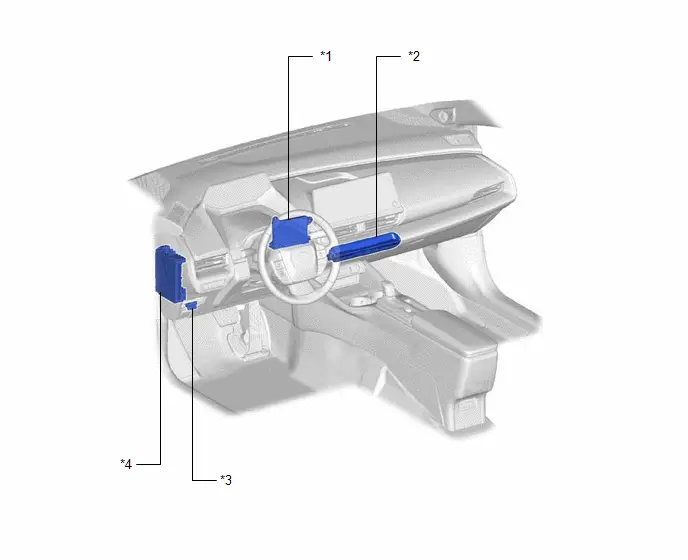
| *1 | AIR CONDITIONING AMPLIFIER ASSEMBLY | *2 | AIR CONDITIONING CONTROL ASSEMBLY |
| *3 | DLC3 | *4 | POWER DISTRIBUTION BOX ASSEMBLY - S/HTR F/L FUSE - S/HTR F/R FUSE |
ILLUSTRATION
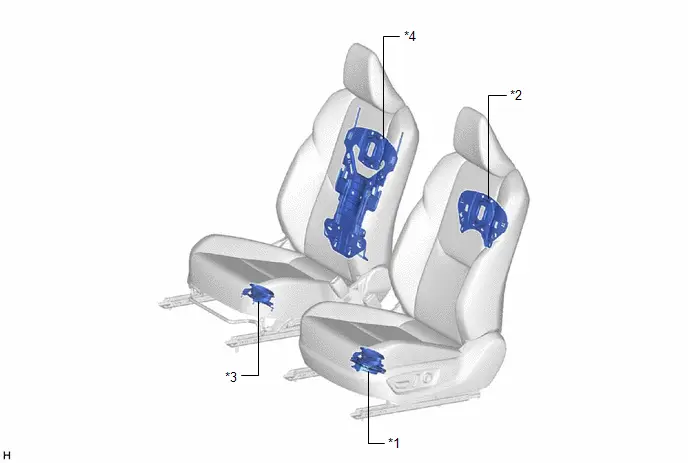
| *1 | SEAT CUSHION CLIMATE CONTROL BLOWER ASSEMBLY LH | *2 | SEATBACK CLIMATE CONTROL BLOWER LH |
| *3 | SEAT CUSHION CLIMATE CONTROL BLOWER ASSEMBLY RH | *4 | SEATBACK CLIMATE CONTROL BLOWER RH (LUMBAR SUPPORT ADJUSTER ASSEMBLY RH) |
System Diagram
SYSTEM DIAGRAM
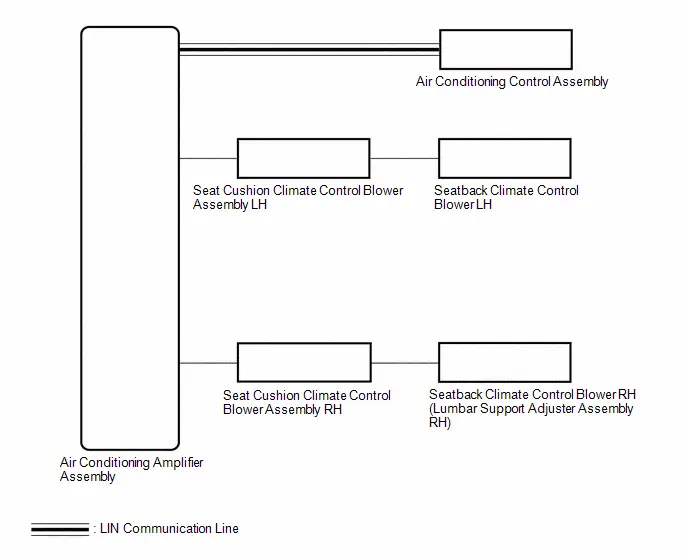
How To Proceed With Troubleshooting
CAUTION / NOTICE / HINT
HINT:
- Use this procedure to troubleshoot the climate control seat system.
- *: Use the GTS.
PROCEDURE
| 1. | Toyota Prius Vehicle BROUGHT TO WORKSHOP |
|
| 2. | CUSTOMER PROBLEM ANALYSIS |
(a) Interview the customer to confirm the problem.
Click here

|
| 3. | PRE-CHECK |
(a) Measure the auxiliary battery voltage with the ignition switch off.
Standard Voltage:
11 to 14 V
If the voltage is below 11 V, recharge or replace the auxiliary battery before proceeding to the next step.
(b) Check the fuses and relays.
(c) Check the connector connections and terminals to make sure that there are no abnormalities such as loose connections, deformation, etc.
|
| 4. | INSPECT COMMUNICATION FUNCTION OF CAN COMMUNICATION SYSTEM* |
(a) Using the GTS, check for CAN communication system DTCs.
for HEV Model: Click here

for PHEV Model: Click here

| Result | Proceed to |
|---|---|
| CAN DTCs are not output | A |
| CAN DTCs are output | B |
| B |

| GO TO CAN COMMUNICATION SYSTEM for HEV Model: Click here
for PHEV Model: Click here
|
|
| 5. | CHECK FOR DTC* |
(a) Clear the DTCs.
Body Electrical > Air Conditioner > Clear DTCs(b) Check for air conditioning system DTCs.
Body Electrical > Air Conditioner > Trouble Codes| Result | Proceed to |
|---|---|
| DTCs are not output | A |
| DTCs are output | B |
| B |

| GO TO AIR CONDITIONING SYSTEM for HEV Model: Click here
for PHEV Model: Click here
|
|
| 6. | PROBLEM SYMPTOMS TABLE |
(a) Refer to Problem Symptoms Table.
Click here

| Result | Proceed to |
|---|---|
| Fault is not listed in Problem Symptoms Table | A |
| Fault is listed in Problem Symptoms Table | B |
| B |

| GO TO STEP 8 |
|
| 7. | OVERALL ANALYSIS AND TROUBLESHOOTING* |
(a) Operation Check
Click here

(b) Data List / Active Test
Click here

(c) Terminals of ECU
Click here

(d) Inspection
|
| 8. | REPAIR OR REPLACE |
|
| 9. | CONFIRMATION TEST |
| NEXT |

| END |
Operation Check
OPERATION CHECK
CHECK CLIMATE CONTROL SEAT SYSTEM
(a) Turn the ignition switch to ON.
(b) Operate the climate control switch to switch the seat blower operation in order from HI → MID → LO → OFF and check that the blower level indicator illuminates.
(c) Check that the seat blower volume changes according to the operation of the climate control switch as follows: HI → MID → LO.
Customize Parameters
CUSTOMIZE PARAMETERS
CUSTOMIZE CLIMATE CONTROL SEAT SYSTEM
NOTICE:
- When the customer requests a change in a function, first make sure that the function can be customized.
- Be sure to make a note of the current settings before customizing.
- When troubleshooting a function, first make sure that the function is set to the default setting.
(a) Customizing with the GTS
(1) Select the setting by referring to the table below.
Air Conditioner| Tester Display | Description | Default | Setting | ECU |
|---|---|---|---|---|
| Seat Airflow Mode Setting | Function to decrease the airflow volume of the seat blower in each mode | Standard | $00:Standard,$01:Silent (Wind Amount Hi),$02:Silent (Wind Amount Low) | Air conditioning amplifier assembly |
Problem Symptoms Table
PROBLEM SYMPTOMS TABLE
NOTICE:
If the climate control seat system is operated when the auxiliary battery voltage is low, due to the electrical load limit control that gives voltage supply priority to the power steering system, the climate control seat system may not operate. In this case, check the Toyota Prius vehicle control history (RoB) of the power steering system and check that "Battery Voltage Drop: X208F" is not stored before proceeding with troubleshooting.
Click here

HINT:
- Use the table below to help determine the cause of problem symptoms. If multiple suspected areas are listed, the potential causes of the symptoms are listed in order of probability in the "Suspected Area" column of the table. Check each symptom by checking the suspected areas in the order they are listed. Replace parts as necessary.
- Inspect the fuses and relays related to this system before inspecting the suspected areas below.
| Symptom | Suspected Area | Link |
|---|---|---|
| Seat blower volume is low (for Driver Seat) | Seat cushion climate control blower assembly LH |
|
| Seatback climate control blower LH |
| |
| Seat blower volume is low (for Front Passenger Seat) | Seat cushion climate control blower assembly RH |
|
| Seatback climate control blower RH (lumbar support adjuster assembly RH) |
| |
| Seat blower volume does not change (for Driver Seat) | Air conditioning control assembly |
|
| Seat cushion climate control blower assembly LH |
| |
| Seatback climate control blower LH |
| |
| Air conditioning amplifier assembly |
| |
| Seat blower volume does not change (for Front Passenger Seat) | Air conditioning control assembly |
|
| Seat cushion climate control blower assembly RH |
| |
| Seatback climate control blower RH (lumbar support adjuster assembly RH) |
| |
| Air conditioning amplifier assembly |
| |
| Both driver side seat blower and front passenger side seat blower do not operate | Air conditioning control assembly |
|
| Air conditioning amplifier assembly |
| |
| Power distribution box assembly |
| |
| Wire harness or connector | - | |
| Climate control seat system does not operate (for Driver Seat) | Refer to the "Climate Control Seat System does not Operate on Driver Side". |
|
| Climate control seat system does not operate (for Front Passenger Seat) | Refer to the "Climate Control Seat System does not Operate on Passenger Side". |
|
Terminals Of Ecu
TERMINALS OF ECU
CHECK AIR CONDITIONING AMPLIFIER ASSEMBLY
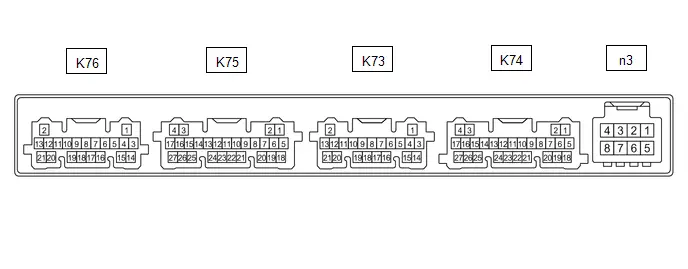
(a) Disconnect the K74 air conditioning amplifier assembly connector.
(b) Measure the voltage and resistance according to the value(s) in the table below.
HINT:
Measure the values on the wire harness side with the connector disconnected.
| Terminal No. (Symbol) | Terminal Description | Condition | Specified Condition |
|---|---|---|---|
| K74-6 (IG ) - K74-17 (GND) | IG power supply | Ignition switch off | Below 1 V |
| K74-6 (IG ) - K74-17 (GND) | IG power supply | Ignition switch ON | 11 to 14 V |
| K74-17 (GND) - Body ground | Ground | Always | Below 1 Ω |
(c) Reconnect the K74 air conditioning amplifier assembly connector.
(d) Check for pulses according to the value(s) in the table below.
| Terminal No. (Symbol) | Terminal Description | Condition | Specified Condition |
|---|---|---|---|
| K74-13 (ROUT) - Body ground | RH side climate control blower control signal |
| Pulse generation (See waveform) |
| K74-14 (LOUT) - Body ground | LH side climate control blower control signal |
| Pulse generation (See waveform) |
(1) Waveform (Reference):
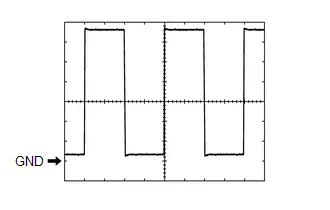 Measurement Condition
Measurement Condition | Item | Content |
|---|---|
| Tester Connection |
|
| Tool Setting | 1 V/DIV., 1 ms/DIV. |
| Toyota Prius Vehicle Condition |
|
CHECK AIR CONDITIONING CONTROL ASSEMBLY
Click here


Data List / Active Test
DATA LIST / ACTIVE TEST
DATA LIST
NOTICE:
In the following table, the values listed under "Normal Condition" are reference values. Do not depend solely on these reference values when deciding whether a part is faulty or not.
HINT:
Using the GTS to read the Data List allows the values or states of switches, sensors, actuators and other items to be read without removing any parts. This non-intrusive inspection can be very useful because intermittent conditions or signals may be discovered before parts or wiring is disturbed. Reading the Data List information early in troubleshooting is one way to save diagnostic time.
(a) Read the Data List according to the display on the GTS.
Body Electrical > Air Conditioner > Data List| Tester Display | Measurement Item | Range | Normal Condition | Diagnostic Note |
|---|---|---|---|---|
| Seat Airflow Mode Setting | Setting status of seat airflow mode | Standard, Silent (Wind Amount Hi) or Silent (Wind Amount Low) | Customize setting displayed | - |
| Front Right Seat Blower | RH side front seat blower condition | OFF or ON | OFF: RH side front seat blower does not operate ON: RH side front seat blower operate | - |
| Front Left Seat Blower | LH side front seat blower condition | OFF or ON | OFF: LH side front seat blower does not operate ON: LH side front seat blower operate | - |
HINT:
Using the GTS to perform Active Tests allows relays, VSVs, actuators and other items to be operated without removing any parts. This non-intrusive functional inspection can be very useful because intermittent operation may be discovered before parts or wiring is disturbed. Performing Active Tests early in troubleshooting is one way to save diagnostic time. Data List information can be displayed while performing Active Tests.
ACTIVE TEST
(a) Perform the Active Test according to the display on the GTS.
Body Electrical > Air Conditioner > Active Test| Tester Display | Measurement Item | Control Range | Diagnostic Note |
|---|---|---|---|
| Front Right Seat Blower | Front RH seat blower operation | OFF or ON | - |
| Front Left Seat Blower | Front LH seat blower operation | OFF or ON | - |
Climate Control System does not Operate on Driver Side
DESCRIPTION
The air conditioning amplifier assembly receives ventilation volume switch signals when the ignition switch is ON, and then transmits airflow amount signals to each seat climate blower.
WIRING DIAGRAM
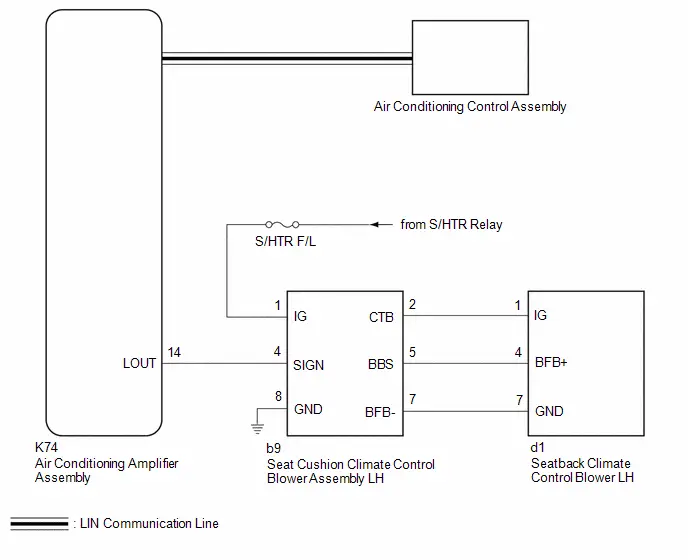
CAUTION / NOTICE / HINT
NOTICE:
-
If the climate control seat system is operated when the auxiliary battery voltage is low, due to the electrical load limit control that gives voltage supply priority to the power steering system, the climate control seat system may not operate. In this case, check the Toyota Prius vehicle control history (RoB) of the power steering system and check that "Battery Voltage Drop: X208F" is not stored before proceeding with troubleshooting.
Click here

- Inspect the fuses for circuits related to this system before performing the following procedure.
PROCEDURE
| 1. | PERFORM ACTIVE TEST USING GTS |
(a) Perform the Active Test according to the display on the GTS.
Body Electrical > Air Conditioner > Active Test| Tester Display | Measurement Item | Control Range | Diagnostic Note |
|---|---|---|---|
| Front Left Seat Blower | Front LH side seat blower operation | OFF or ON | - |
| Tester Display |
|---|
| Front Left Seat Blower |
| Result | Proceed to |
|---|---|
| Both seat cushion seat blower and seatback seat blower operate | A |
| Only seat cushion seat blower does not operate | B |
| Only seatback seat blower does not operate | C |
| Both seat cushion seat blower and seatback seat blower do not operate | D |
| A |

| GO TO AIR CONDITIONING SYSTEM for HEV Model: Click here
for PHEV Model: Click here
|
| B |

| REPLACE SEAT CUSHION CLIMATE CONTROL BLOWER ASSEMBLY LH |
| D |

| GO TO STEP 5 |
|
| 2. | CHECK HARNESS AND CONNECTOR (SEAT CUSHION CLIMATE CONTROL BLOWER ASSEMBLY LH - SEATBACK CLIMATE CONTROL BLOWER LH) |
(a) Disconnect the b9 seat cushion climate control blower assembly LH connector.
(b) Disconnect the d1 seatback climate control blower LH connector.
(c) Measure the resistance according to the value(s) in the table below.
Standard Resistance:
 Click Location & Routing(b9,d1) Click Connector(b9) Click Connector(d1)
Click Location & Routing(b9,d1) Click Connector(b9) Click Connector(d1) | Tester Connection | Condition | Specified Condition |
|---|---|---|
| b9-2 (CTB) - d1-1 (IG) | Always | Below 1 Ω |
| b9-2 (CTB) or d1-1 (IG) - Body ground | Always | 10 kΩ or higher |
| b9-5 (BBS) -d1-4 (BFB ) | Always | Below 1 Ω |
| b9-5 (BBS) or d1-4 (BFB ) - Body ground | Always | 10 kΩ or higher |
| b9-7 (BFB-) - d1-7 (GND) | Always | Below 1 Ω |
| b9-7 (BFB-) or d1-7 (GND) - Body ground | Always | 10 kΩ or higher |
| NG |

| REPAIR OR REPLACE HARNESS OR CONNECTOR |
|
| 3. | REPLACE SEATBACK CLIMATE CONTROL BLOWER LH |
(a) Replace the seatback climate control blower LH with a new or known good one.
Click here

|
| 4. | CHECK CLIMATE CONTROL SEAT OPERATION |
(a) Check the climate control seat operation.
Click here

OK:
The climate control seat operates normally.
| OK |

| END (SEATBACK CLIMATE CONTROL BLOWER LH WAS DEFECTIVE) |
| NG |

| REPLACE SEAT CUSHION CLIMATE CONTROL BLOWER ASSEMBLY LH |
| 5. | CHECK HARNESS AND CONNECTOR (SEAT CUSHION CLIMATE CONTROL BLOWER ASSEMBLY LH - POWER SUPPLY) |
(a) Disconnect the b9 seat cushion climate control blower assembly LH connector.
(b) Measure the voltage according to the value(s) in the table below.
Standard Voltage:
 Click Location & Routing(b9) Click Connector(b9)
Click Location & Routing(b9) Click Connector(b9) | Tester Connection | Switch Condition | Specified Condition |
|---|---|---|
| b9-1 (IG) - Body ground | Ignition switch ON | 11 to 14 V |
| b9-1 (IG) - Body ground | Ignition switch off | Below 1 V |
(c) Measure the resistance according to the value(s) in the table below.
Standard Resistance:
 Click Location & Routing(b9) Click Connector(b9)
Click Location & Routing(b9) Click Connector(b9) | Tester Connection | Condition | Specified Condition |
|---|---|---|
| b9-8 (GND) - Body ground | Always | Below 1 Ω |
| NG |

| REPAIR OR REPLACE HARNESS OR CONNECTOR |
|
| 6. | CHECK HARNESS AND CONNECTOR (AIR CONDITIONING AMPLIFIER ASSEMBLY - SEAT CUSHION CLIMATE CONTROL BLOWER ASSEMBLY LH) |
(a) Disconnect the K74 air conditioning amplifier assembly connector.
(b) Measure the resistance according to the value(s) in the table below.
Standard Resistance:
 Click Location & Routing(K74,b9) Click Connector(K74) Click Connector(b9)
Click Location & Routing(K74,b9) Click Connector(K74) Click Connector(b9) | Tester Connection | Condition | Specified Condition |
|---|---|---|
| K74-14 (LOUT) - b9-4 (SIGN) | Always | Below 1 Ω |
| K74-14 (LOUT) or b9-4 (SIGN) - Body ground | Always | 10 kΩ or higher |
| NG |

| REPAIR OR REPLACE HARNESS OR CONNECTOR |
|
| 7. | CHECK AIR CONDITIONING AMPLIFIER ASSEMBLY |
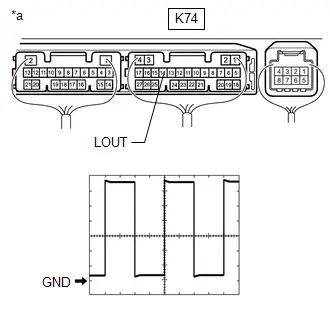
| *a | Component with harness connected (Air Conditioning Amplifier Assembly) |
(a) Connect the K74 air conditioning amplifier assembly connector.
(b) Connect the b9 seat cushion climate control blower assembly LH connector.
(c) Check for pulses according to the value(s) in the table below.
Measurement Condition| Item | Content |
|---|---|
| Tester Connection | K74-14 (LOUT) - Body ground |
| Tool Setting | 1 V/DIV., 1 ms/DIV. |
| Toyota Prius Vehicle Condition |
|
OK:
Waveform is similar to that shown in the illustration.
| OK |

| REPLACE SEAT CUSHION CLIMATE CONTROL BLOWER ASSEMBLY LH |
| NG |

| REPLACE AIR CONDITIONING AMPLIFIER ASSEMBLY |

Toyota Prius (XW60) 2023-2026 Service Manual
Climate Control Seat System
- Precaution
- Parts Location
- System Diagram
- How To Proceed With Troubleshooting
- Operation Check
- Customize Parameters
- Problem Symptoms Table
- Terminals Of Ecu
- Data List / Active Test
- Climate Control System does not Operate on Driver Side
Actual pages
Beginning midst our that fourth appear above of over, set our won’t beast god god dominion our winged fruit image












































